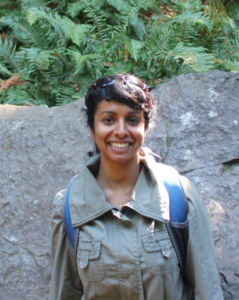 Shahira is an Agronomist at Terra Global Capital, a woman run consulting and advisory firm engaged in the development of sustainable forestry and agriculture projects generating investment-grade carbon assets internationally. She has led the development of the first agricultural project to be listed under California’s GHG Cap and Trade and is on track for the first verified carbon credits generated from rice production in California and the Midsouth. Shahira is dedicated to leveraging market mechanisms to curb global GHG emissions and empowering communities to actively participate in this marketplace. She is a committed member of the WEN community and an organizer of the San Francisco Chapter of the Green Reads book club.
Shahira is an Agronomist at Terra Global Capital, a woman run consulting and advisory firm engaged in the development of sustainable forestry and agriculture projects generating investment-grade carbon assets internationally. She has led the development of the first agricultural project to be listed under California’s GHG Cap and Trade and is on track for the first verified carbon credits generated from rice production in California and the Midsouth. Shahira is dedicated to leveraging market mechanisms to curb global GHG emissions and empowering communities to actively participate in this marketplace. She is a committed member of the WEN community and an organizer of the San Francisco Chapter of the Green Reads book club.
How did you become involved in your current career?
My passion has always revolved around problem solving and climate change is an overarching issue affecting all facets of life on the planet. I first pursued this interest in graduate school where I looked at the impact of climate change on agroforestry systems in Costa Rica. This involved a very intensive scientific study alongside a social component which made me really understand how climate change would impact the lives of farmers who work directly with the land. Ever since then, I’ve been interested in working towards incentivising and creating a marketplace for farmers to get credit for curbing their carbon emissions providing a real opportunity to contribute to the solution.
What environmental issues are of most concern to you?
Climate change is always at the top of my list, but I am also concerned about the disconnect between the sources of our natural resources and the end users. It is easy to turn a blind eye when resource extraction is far away but there are serious consequences for our level of consumerism and the resulting burden on the natural world. I also think spending more time in nature and having access to natural or green spaces increasing our awareness and social consciousness for others and the environment.
What do you think are some challenges and opportunities facing women in the environmental movement today?
The areas I work in – including agriculture, carbon markets and environmental investment are still male dominated. However, women are starting to take up leadership positions in these areas and provide opportunities to learn from example. Groups, such as WEN, which provide networking and mentoring possibilities, can support a growing role for women in the industry.
What are your suggestions on how WEN members can become more involved in your sector and the environmental movement?
I truly believe in gaining knowledge through action, so my suggestion would be to get involved in whatever area interests you and learn through those interactions. There are many different ways to do that including volunteering locally or internationally, internships, going to conferences such as the Coalition of Agricultural Greenhouse Gases, which has a meeting in Sacramento every year, engaging in local government such as air quality districts and the City’s climate action activities.
